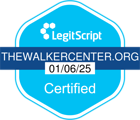Rethinking Resolutions: How to Make 2025 a Year of Lasting Change
As the new year approaches, many of us start thinking about resolutions: goals we set with the best of intentions, only to find ourselves falling back into old habits all too soon. If you're in recovery or seeking personal growth, 2025 is an opportunity to approach resolutions differently.
By focusing on meaningful, achievable goals and using support systems and recovery resources like The Walker Center’s, you can create a plan that sticks and leads to lasting change. Here’s how to rethink your resolutions and make 2025 a year of real progress.
1. Reflect Before You Resolve
Before you set any goals, take time to reflect on what you truly want to achieve. Often, resolutions fail because they’re reactive or vague, such as “get healthier” or “be happier.” Instead, dig deeper:
Know what truly matters to you: Is it rebuilding relationships, maintaining sobriety, or pursuing a lifelong passion?
Identify challenges from previous years: Identifying patterns or obstacles can help you create resolutions that address the root causes of setbacks.
Find your strengths: Recognizing what you’re already doing well can guide you toward goals that build on your success.
Reflection helps clarify your goals and aligns them with your values and priorities.
2. Set SMART Goals
A common mistake with resolutions is making them too broad or unrealistic. Instead, use the SMART framework from our free guide here to set goals that are:
Specific: Clearly define what you want to achieve. Instead of saying, “I want to get healthier,” specify, “I will walk for 30 minutes five times a week.”
Measurable: Have a way to track progress, whether it’s a journal or calendar or something else, so you can see how far you’ve come.
Achievable: Make sure the goal is realistic. While it’s great to aim high, setting unattainable goals can lead to frustration and burnout.
Relevant: Ensure the goal aligns with your recovery or personal growth.
Time-bound: Set a deadline or timeline to keep yourself accountable.
If you’re in recovery, a SMART goal might be: “I will attend three support group meetings per week for the next three months.”
3. Focus on Positive Change
Instead of framing resolutions as restrictions or punishments, think of them as opportunities to make changes for the good.
Add Instead of Subtract: Instead of saying, “I won’t eat junk food,” try, “I will cook three healthy meals at home each week.”
Celebrate Progress: Small wins deserve recognition. Every step you take toward your goal is progress worth celebrating.
Practice Self-Compassion: Recovery and personal growth are marathons, not sprints. Be kind to yourself and use setbacks as learning opportunities.
4. Prioritize Your Recovery
If you’re in recovery, maintaining sobriety should remain at the center of your resolutions. The new year is a great time to recommit your goals and explore additional resources to strengthen your journey.
Leverage Free Recovery Resources: The Walker Center offers various guides, including the Free Guide for Holidays: Sober Holidays and Free Guide for Holidays: Helping an Addict Get Through the Holidays. These tools can help you navigate triggers and maintain your focus beyond the holiday season.
Connect With Support Groups: Attend regular meetings or join online communities to stay connected with others who understand your journey.
5. Build a Strong Support Network
Achieving any resolution is easier with a support system. Surround yourself with people who uplift and encourage you; this can be family, friends, or peers in recovery.
Communicate Your Goals: Share your resolutions with trusted loved ones so they can help you stay accountable.
Seek Professional Guidance: Counselors, therapists, or recovery coaches can provide tools and strategies to help you stay on track.
Create Shared Goals: Invite friends and family to join you in your resolution. Whether it’s exercising together or exploring a new hobby, shared goals can be motivating and fun.
6. Embrace the Journey
Resolutions are about growth, learning, and becoming the best version of yourself.
Focus on the Process: Instead of obsessing over the end result, appreciate the small, positive changes you’re making every day.
Celebrate Milestones: Recognize and reward yourself for progress along the way. These celebrations reinforce your commitment and keep you motivated.
Stay Present: Avoid overwhelming yourself with long-term outcomes. Take things one step, one day at a time.
They say a journey begins with a single step, and there’s no better time to make the first step than as your ring in a new year.
Looking Ahead to a Brighter 2025
The new year is a chance to write a new chapter, your story and focus on what matters. By setting meaningful goals, prioritizing your recovery, and leaning on support systems like The Walker Center, you can make 2025 a year of positive, lasting change.
Take advantage of The Walker Center’s free recovery resources to guide you through the holiday season and beyond. And don’t hesitate to reach out for more information on our recovery options.
Here’s to a year of progress, possibility, and peace.




